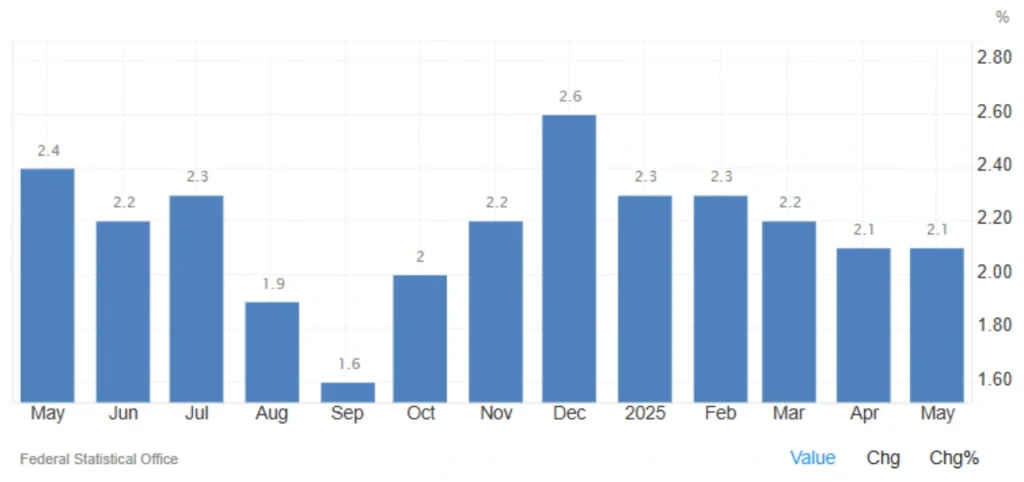
Germany’s Inflation Holds Steady in May 2025
Germany’s consumer inflation rate remained unchanged at 2.1% in May 2025, matching April’s figure and marking the lowest rate since October 2024. The May inflation reading came in slightly above market expectations of 2.0%, staying above the European Central Bank’s (ECB) 2% target for the seventh consecutive month. This stability reflects Germany’s inflation dynamics.
Educational Spotlight: Why CPI Matters in European Monetary Policy
The Consumer Price Index (CPI) is the key benchmark for tracking inflation across the Eurozone. The ECB targets a 2% inflation rate to maintain price stability. Persistent overshoots may influence future monetary policy decisions.
📉 As the largest economy in the Eurozone, Germany’s inflation trends, especially persistent ones, play a significant role in shaping ECB’s policy direction.

🧩 Inflation Breakdown
- Services inflation eased to 3.4% (down from 3.9% in April).
- Goods inflation rose to 0.9% (up from 0.5%), primarily due to a slower decline in energy prices.
- Food prices held steady at 2.8%.
- Energy prices dropped by 4.6%, compared to a 5.4% decline in April.
📌 Core inflation — excluding volatile food and energy — edged down from 2.9% to 2.8%. Hence, Germany’s inflation dynamics present an interesting mix.
On a monthly basis, the CPI rose by just 0.1%, down from a 0.4% gain in April.
Read More: What Is Germany’s DAX Index?
Implications for the ECB
📌 The stable headline inflation at 2.1%, alongside a slight decline in core inflation, gives the ECB room to maintain its “wait and see” approach.
📉 The fall in services inflation suggests gradual easing of wage and domestic cost pressures. In essence, Germany’s inflationary trends provide clues for policy adjustments.
Outlook
Although inflation is easing, its persistence above the ECB’s 2% target may slow down plans for rate cuts. If this trend continues into the summer, the ECB is likely to proceed with only limited and gradual rate reductions in the second half of the year. Germany’s inflation context will be critical for these decisions.
📈 Meanwhile, bond markets and the euro will be closely watching core inflation trends to anticipate the timing of the ECB’s next policy shift.
Share
Hot topics

Best broker for gold trading
There’s always been a certain magic about gold. Before online charts and trading applications, people stored their wealth in coins and bars, trusting that gold would retain its value during...
Read more




Submit comment
Your email address will not be published. Required fields are marked *